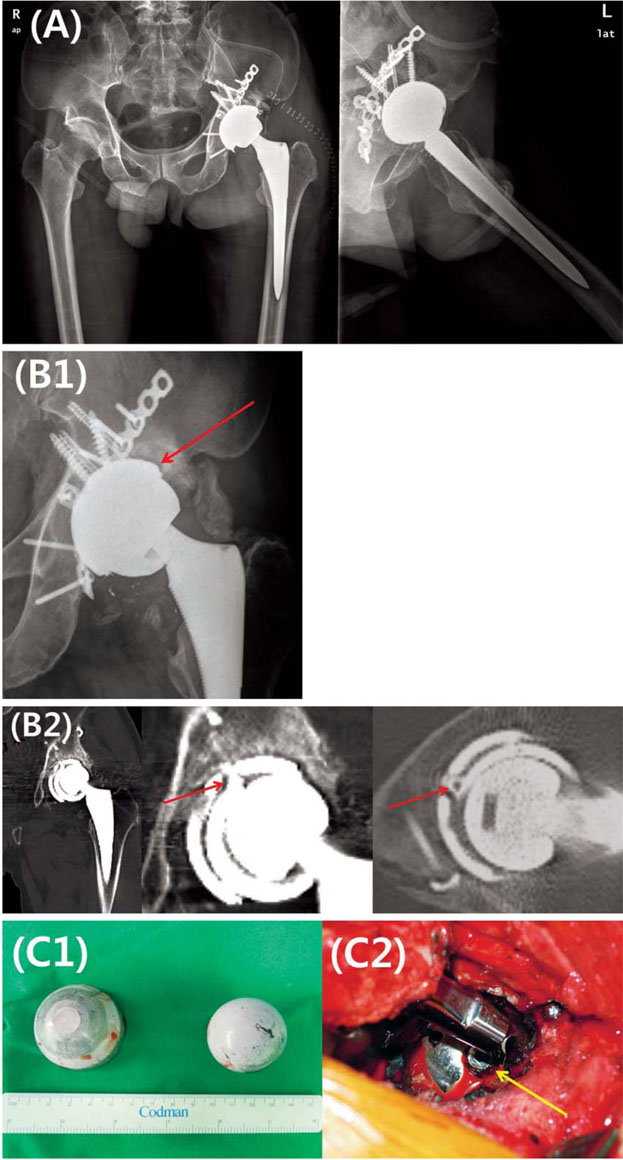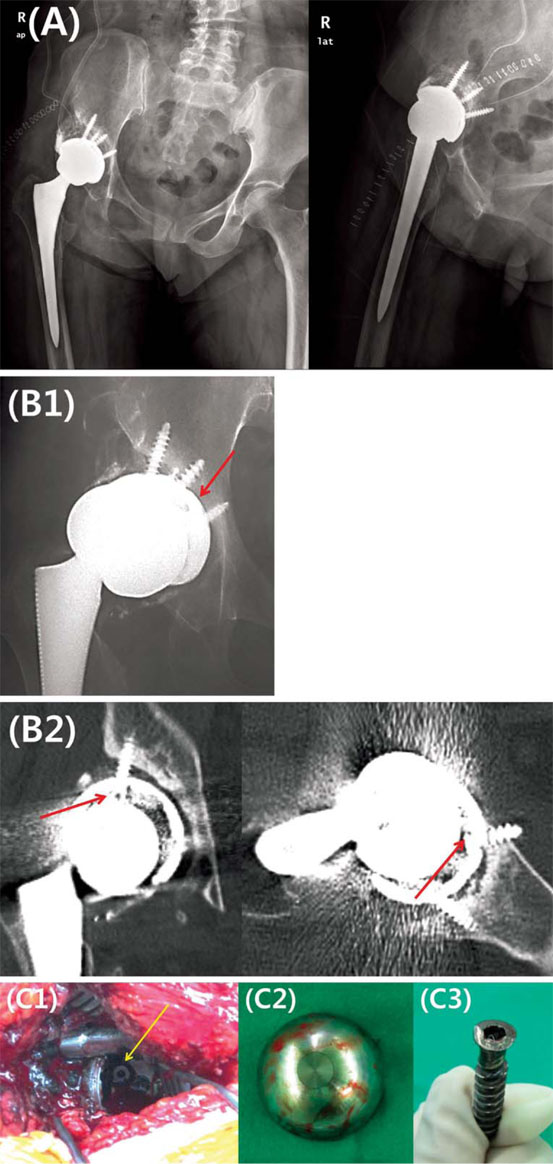Hip Pelvis.
2013 Sep;25(3):220-225. 10.5371/hp.2013.25.3.220.
Liner Dissociation by Extrusion of the Acetabular Cup Fixation Screw after Total Hip Replacement: Two Cases Report
- Affiliations
-
- 1Department of Orthopaedic Surgery, Chungnam National University School of Medicine, Daejeon, Korea. dshwang@cnu.ac.kr
- 2Department of Orthopedic Surgery, Busan Bumin Hospital, Busan, Korea.
- 3Department of Orthopedic Surgery, Seoul Bumin Hospital, Seoul, Korea.
- KMID: 1974378
- DOI: http://doi.org/10.5371/hp.2013.25.3.220
Abstract
- This is a report of 2 cases that showed dissociation of the acetabular cup liner by acetabular fixation screw among patients who underwent total hip replacement. Screws for fixation of the acetabular cup were used during the primary surgery in both cases. Each patient visited the out patient department complaining of pain and noise from the joint; radiologic finding revealed a collapse of the column shape bone graft area with dissociation of the acetabular cup liner. In both cases, during revision surgery, screw was extruded to the inner side of the acetabular cup, since it migrated superiorly. There has been no report of liner dissociation by extrusion of acetabular cup fixation screw after total hip replacement. Therefore, we report two cases of dissociation of the acetabular cup liner of hip arthroplasty, which occurred due to screw issues after total hip replacement with structural autogenous bone graft.
Figure
Reference
-
1. Ong KL, Mowat FS, Chan N, Lau E, Halpern MT, Kurtz SM. Economic burden of revision hip and knee arthroplasty in Medicare enrollees. Clin Orthop Relat Res. 2006; 446:22–28.
Article2. Yoo MC, Cho YJ, Kim KT, Kim KI, Park JY, Hwang DW. Dissociation of the polyethylene liner from the acetabular metal shell. J Korean Hip Soc. 2000; 12:92–101.3. Rozkydal Z, Janícek P, Smíd Z. Total hip replacement with the CLS expansion shell and a structural femoral head autograft for patients with congenital hip disease. J Bone Joint Surg Am. 2005; 87:801–807.
Article4. Sporer SM, O'Rourke M, Chong P, Paprosky WG. The use of structural distal femoral allografts for acetabular reconstruction. Average ten-year follow up. J Bone Joint Surg Am. 2005; 87:760–765.
Article5. Willert HG, Semlitsch M. Reactions of the articular capsule to wear products of artificial joint prostheses. J Biomed Mater Res. 1977; 11:157–164.
Article6. Sedel L. Evolution of alumina-on-alumina implants: a review. Clin Orthop Relat Res. 2000; (379):48–54.7. Moon DH, Choi JS, Kim DW, Kim KH. Ceramic on ceramic total hip arthroplasty: the results of a minimum 10-years follow up. J Korean Hip Soc. 2011; 23:116–123.
Article8. Lee JM, Roh JY, Park YS. Results of revision hip arthroplasty using cemented femoral stem. J Korean Hip Soc. 2007; 19:472–478.
Article9. Spangehl MJ, Berry DJ, Trousdale RT, Cabanela ME. Uncemented acetabular components with bulk femoral head autograft for acetabular reconstruction in developmental dysplasia of the hip: results at five to twelve years. J Bone Joint Surg Am. 2001; 83-A:1484–1489.10. Hooten JP Jr, Engh CA Jr, Engh CA. Failure of structural acetabular allografts in cementless revision hip arthroplasty. J Bone Joint Surg Br. 1994; 76:419–422.
Article11. Hwang KT, Kim YH. Revision total hip arthroplasty of an acetabular cup with acetabular bone defects. J Korean Hip Soc. 2011; 23:237–247.
Article
- Full Text Links
- Actions
-
Cited
- CITED
-
- Close
- Share
- Similar articles
-
- Dissociation of Polyethylene liner in Metal backed Cup without Hip Dislocation History: A Case Report
- Dissociation of Sandwich Ceramic Liner: A Case Report
- The analysis of Affecting Factors for the Dissociation of the Polyethylene Liner in Cementless Harris-Galante Acetabular Component
- Acetabular Cup Revision
- Failure Mode of Polyethylene Liner in Total Hip Arthroplasty with Harris-Galante II Acetabular Cup



